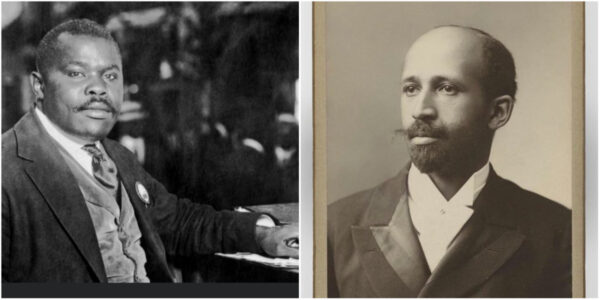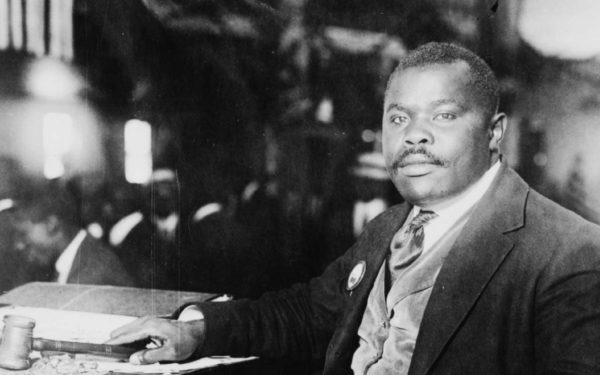A pair of Black lawmakers want President Joe Biden to exonerate Black nationalist and leader of the Pan-Africanism movement, Marcus Garvey.
Democratic representatives Yvette Clarke of New York and Hank Johnson of Georgia are the latest in a growing chorus of Garvey supporters asking for the government to right a wrong for one of the nation’s most influential social justice activists. Their resolution was introduced on Feb. 17 and sits with the House Judiciary Committee.
“America must right these wrongs and restore Garvey’s legacy,” Rep. Clarke told the Jamaica Observer.
Garvey, born on Aug. 17, 1887, in St. Ann’s Bay, Jamaica was a Black nationalist leader and was world-renowned for the “Back to Africa” movement, which sought to establish a self-governing Black nation.
The campaign to exonerate Garvey of mail fraud charges to which he was ultimately convicted in 1923 has been ongoing for years.
“The utter lack of merit to the charges on which he was originally convicted combined with his profound legacy and contributions to Black history in our country – it’s time to right this fundamental wrong,” Rep. Johnson said.

One of the leading voices behind the effort to exonerate Garvey has been his son, Dr. Julius Garvey, 89. Julius Garvey is a cardiothoracic and vascular surgeon in New York. He often gives lectures on his father’s life and legacy.
“President Biden has an understanding of what we as a people have gone through,” Julius Garvey told The Washington Post.
“I think he owes something of his presidency to African-Americans. It is time for this to be righted with someone whose only crime was to help his people,” Julius Garvey added.
“Garvey’s life and contributions to the United States should be recognized and appropriate steps taken to restore his name and reputation in this country,” the resolution says.
“The world deserves to know the truth about Marcus Mosiah Garvey and the truth about Black history,” Clarke said.
Marcus Garvey was born to a father who worked as a stonemason and a mother who was a domestic servant. He traveled and worked in different parts of Latin America before studying law and philosophy at the University of London’s Birkbeck College.
Garvey founded the Universal Negro Improvement Association in July 1914. The organization was created to achieve Black nationalism through the celebration of African history and culture. Garvey was known for promoting Black economic independence. He launched several businesses, including restaurants and shopping centers, and founded the Negro World newspaper.
It was also around this time that Garvey’s ideology clashed with other prominent Black thought leaders, most notably W.E.B. DuBois. Garvey’s Black nationalist ideology promoted Black separatism, which opposed beliefs from the likes of W.E.B. DuBois, who shared his philosophy of integration.

Among Garvey’s business ventures supporting Black independence, he created the Black Star Line to promote his “Back to Africa” movement. The Black Star Line was a Black-owned passenger line involving a ship named S.S. Phyllis Wheatley that carried people to and from Africa.
It was Garvey’s Black Star Line that caused him to fall into the crosshairs of the federal government. Barbara Bair, a Duke University historian, said Garvey’s mail fraud charge by government officials was really about opposition to UNIA and what it stands for: Black independence.
“The mail fraud charge they actually settled on stemmed from the purchase of Black Star Line stock through the U.S. mail in response to the advertisement in UNIA brochures and in the pages of the “Negro World” newspaper,” Bair said to PBS.
The Black Star Line did not legally own the ship it intended to use to transport people to Africa, despite ongoing advertisements.
“It was a catch-22 situation for the UNIA; the sale of stock was needed to raise the funds necessary to fully complete the transaction that would legally transfer the ownership and operation of the ship to the Black Star Line, but at the same time, the UNIA did not officially own the ship in question for which it was issuing stock,” Bair added.
As Garvey’s business dealings become more publicly known, his watchful nemesis DuBois grew “suspicious of Garvey’s methods, ideas and motives and published his own damning exposé of Black Star Line finances in “The Crisis,” a competitor of Garvey’s “Negro World” newspaper according to PBS.
In 1921, Garvey’s company announced to stockholders it would buy two more ships. The announcement motivated “a competitor of Garvey’s “Negro World” newspaper to publish an investigation claiming the U.S. Department of Commerce “had no record of those ships,” The Washington Post reported.
This exposé led to Garvey and three business associates being indicted on charges of “conspiracy to use the mails in furtherance of a scheme to defraud,” according to Congressional records obtained by The Washington Post.
The federal trial lasted five weeks. During the trial, the testimony of a purchaser of the Black Star Line stock, Benny Dancy, proved crucial to the alleged mail fraud charge.
The government presented an “empty envelope addressed to Dancy, claiming that a letter promoting the stock purchase had been mailed inside of it,” according to The Washington Post. Dancy admitted receiving the envelope and furthering the envelope to “government agents.” He also reportedly testified that the FBI coached him on his impending testimony.
At the conclusion of the trial on June 21, 1923, Garvey was convicted of mail fraud and sentenced to five years in prison at Atlanta Federal Penitentiary. The three other defendants were acquitted of the charges.
Garvey’s prison sentence was commuted on Nov. 18, 1927, by President Calvin Coolidge, although Garvey’s supporters wanted a presidential pardon at the time. A pardon would have deleted the conviction while a commutation keeps the conviction but reduces the punishment.
“The real transparency comes from looking at the records of J. Edgar Hoover and looking at his history and past with respect to the Black community,” Clarke said.

After Garvey’s release from prison, he was deported back to Jamaica where he continued his political activism, according to The Jamaica Observer.
In 1935, Garvey moved to London where he lived out the rest of his life until his death on June 10, 1940, after multiple strokes, according to The National Archives.
After Garvey’s death, his conviction still haunted his supporters.
“When it comes to Marcus Garvey, not just an individual was harmed, not just a family was harmed, but millions of people around the world are harmed by the destruction of the social justice movement. The U.S. government played a role in the false conviction of Marcus Garvey,” Howard University professor Justin Hansford told The Washington Post.
The effort to exonerate Marcus Garvey has led to petitions, books and campaigns all aimed at clearing Garvey’s record of the conviction his supporters felt had no merit and was prompted by his Black nationalist stance.
“The campaign to exonerate Marcus Garvey has been steadily growing, it’s time to correct this injustice,” Johnson said.
“As a student of Garvey’s teaching. I felt if I were ever in a position to bring sunlight to the way in which he was railroaded, I would take that opportunity,” Clarke said.
The White House did not immediately respond to Atlanta Black Star’s requests for comment regarding the resolution to exonerate Garvey.
Representatives Clarke and Johnson admit the uphill battle their resolution faces but remain hopeful.
“This resolution is part of the growing movement to exonerate Garvey and correct the injustices of the past. Given the nature of the Republican-controlled House — it’s a long shot. But that won’t deter us from continuing to restore the legacy of Marcus Garvey,” Clarke said.
We will continue to follow this story as it develops.


